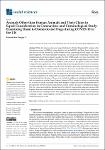Animals Other than Human Animals and Their Claim to Equal Consideration in Coronavirus and Criminological Study: Examining Harm to Domesticated Dogs during COVID-19 in the UK
| dc.contributor.author | Gregory, RK | |
| dc.date.accessioned | 2023-03-24T14:15:08Z | |
| dc.date.available | 2023-03-24T14:15:08Z | |
| dc.date.issued | 2023-03-24 | |
| dc.identifier.issn | 2076-0760 | |
| dc.identifier.issn | 2076-0760 | |
| dc.identifier.uri | https://pearl.plymouth.ac.uk/handle/10026.1/20627 | |
| dc.description.abstract |
While the financial and social support afforded to United Kingdon (UK) ‘animals other than human animals’ (AOTHAs) welfare charities, such as the RSPCA and Dogs Trust, could suggest that they are valued intrinsically within Western society criminological texts largely omit them from recognition, with some important exceptions, see non-speciesist criminology. Most human animals likely do not want to directly or indirectly harm AOTHAs and even value relationships with “companion” AOTHAs. Regardless, AOTHAs have been victimized throughout history and continue to be. This article examines harm to AOTHAs in the context of the global COVID-19 pandemic to argue that abuse proliferates where harmful subjectivities are generated by society’s acceptance of (1) the anthropocentric culture, and (2) when humanity values their individual advancement within the competitive consumer culture. Companion dogs were specifically focused upon within this article due to their so called close emotional and physical proximity to human animals, with proximity meaning that they were directly impacted by the lockdown measures implemented. The coronavirus pandemic was addressed by governments throughout the world by initiating an array of social restrictions. Because of these social restrictions, millions of individuals within England, and in countries such as the United States of America (USA), decided to adopt or purchase dogs for a variety of reasons, including to help them mitigate feelings of isolation and loneliness and to provide them with an excuse to participate in outdoor exercise. In order to determine the impact that the coronavirus pandemic has had upon the plight of domesticated companion dogs within England, semi-structured interviews, document analyses, and observation research were undertaken. The initial analysis of data presented here suggests that the coronavirus pandemic threatened the wellbeing of dogs within England, with their reproductive, physical, medical, and psychological wellbeing being put at risk. | |
| dc.format.extent | 195-195 | |
| dc.language | en | |
| dc.publisher | MDPI | |
| dc.title | Animals Other than Human Animals and Their Claim to Equal Consideration in Coronavirus and Criminological Study: Examining Harm to Domesticated Dogs during COVID-19 in the UK | |
| dc.type | journal-article | |
| plymouth.issue | 4 | |
| plymouth.volume | 12 | |
| plymouth.publication-status | Published online | |
| plymouth.journal | Social Sciences | |
| dc.identifier.doi | 10.3390/socsci12040195 | |
| plymouth.organisational-group | |Plymouth | |
| plymouth.organisational-group | |Plymouth|Faculty of Arts, Humanities and Business | |
| plymouth.organisational-group | |Plymouth|Users by role | |
| plymouth.organisational-group | |Plymouth|Users by role|Academics | |
| plymouth.organisational-group | |Plymouth|Users by role|Post-Graduate Research Students | |
| plymouth.organisational-group | |Plymouth|Faculty of Arts, Humanities and Business|School of Society and Culture | |
| dcterms.dateAccepted | 2023-03-21 | |
| dc.date.updated | 2023-03-24T14:15:06Z | |
| dc.rights.embargodate | 2023-3-28 | |
| dc.identifier.eissn | 2076-0760 | |
| dc.rights.embargoperiod | forever | |
| rioxxterms.versionofrecord | 10.3390/socsci12040195 |


